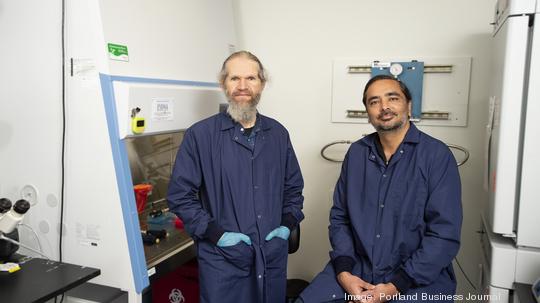
The World Health Organization has found that up to half of vaccines are wasted across the world for various reasons, including lack of cold storage.
Ken Stedman, a biology professor at Portland State University who has researched extreme viruses for more than 20 years, has a potential solution. He developed a silica-coating technology to stabilize vaccines and avoid the need for refrigeration, potentially saving lives as well as reducing transportation and storage costs.
Stedman spun off StoneStable Inc. from PSU in 2014 and focused his attention on flu vaccines. Now he’s looking to test out the silica method on vaccines for Covid-19.
StoneStable has raised about $600,000 to date in grants in pre-seed funding and is in the midst of a $1.5 million to $2 million seed round, said Kabir Bhatia, who became StoneStable’s first CEO about a year ago.
“Most vaccines require dramatic refrigeration, and the cost of disseminating the vaccine is so much more in the supply chain, relative to cost of manufacturing, so a company like StoneStable could completely disrupt that and be an important tool in how we fight viruses in the future,” Bhatia said.
Building a company
Stedman did not set out to tackle vaccine spoilage. In the early 2010s, he was trying to detect fossil viruses in volcanic hot spring environments. He and his grad student, Jim Laidler, created those conditions, which contain high concentrations of silica, in the lab. They inserted viruses, which became coated in silica.
“The problem was if we left them in those conditions for several days, they became unrecognizable blobs,” Stedman said.
The viruses also lost their infectivity but could get it back after a few hours. The two researchers ran the deactivation-reactivation experiment with the smallpox vaccine, which became the basis of their patent application.
They also realized the technology “could be really useful” in addressing vaccine spoilage, especially in developing countries, where maintaining vaccines at controlled temperatures is often impossible.
Stedman moved StoneStable into the OTRADI Bioscience Incubator on Portland’s South Waterfront. In 2016, he received a $224,993 grant from the National Institutes of Health. He started with the flu vaccine, since it’s disseminated everywhere and is one of the largest drivers of the vaccine market.
Last year, Bhatia came on board. A mechanical engineer by training, Bhatia also spent five years on Wall Street as an investment banker after business school, then moved into corporate finance, at Mattel and Nike Inc.
He had two insights.
“Technical founders make horrible businesspeople,” Bhatia said. “We have groundbreaking research taking place in our back yard, but we don’t have the commercial success to show for it. There are scientific papers, but we don’t have the companies created on the backs of that research and development.”
He wanted to help technical founders build companies around their innovations and raise capital. When Covid hit, he was tapped as CEO for an OHSU spinout called Auxetics Inc., where he raised a seed round.
“My goal is to parachute into companies, help them develop a strategy, get them funded and allow them to go on their path,” Bhatia said. Founders must be “coachable, they’ve got to be really interested in building a company and willing to relinquish the CEO job,” Bhatia said. “I was very fortunate to meet with Ken (Stedman). He displays all those attributes in spades.”
Stedman said Bhatia has helped him to focus, “to put on those blinders and think about the company, rather than this shiny new thing, a shiny new virus.”
‘Yummier’
Stedman is eyeing StoneStable’s technology for viral vector-based, or adenovirus, vaccines, such as those made by Johnson & Johnson. That’s largely because Stedman said he has more experience in those vaccines than mRNA vaccines, such as those made by Pfizer and Moderna.
A team at the University of Bath in the U.K. is also working on a similar approach, applying silica to protein-based vaccines.
So far, Stedman’s results on animal liver cells in the lab have been promising.
“One thing we see is when we treat an adenovirus vaccine with silica is that it’s stabilized,” Stedman said. “What the silica does is you can freeze and thaw multiple times, and the vaccine should still be useful.”
Stedman’s other discovery is that the silica-treated vaccine seems to work better in terms of the amount needed.
“It looks like you could use a lot less and get the same effect, if it’s silica coated,” Stedman said. “It makes it yummier.”
Stedman and Bhatia have reached out to about 10 pharmaceutical companies to discuss possible partnerships. StoneStable also moved into a larger lab space at OTRADI.
“The technologies getting unlocked because of research on Covid vaccines are going to be instrumental on all kinds of vaccines in the future,” Bhatia said. “And those will also require stabilization to get them to scale, so there’s really important value coming out of this.”
STONESTABLE
What: Developing a silica coating for making vaccines more stable at different temperatures
CEO: Kabir Bhatia
Founder and chief scientific officer: Ken Stedman
Employees: None full time
Founded: 2014
Location: OTRADI Bioscience Incubator



